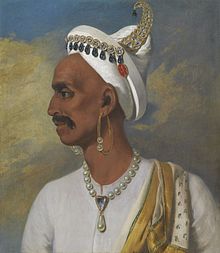Nana Phadanvis
| Nana Fadnavis | |
|---|---|

Portrait by John Thomas Seton
|
|
| Born | February 12, 1742 present-day Satara, Maharashtra, India |
| Died | March 13, 1800 present-day Pune, Maharashtra, India |
| Religion | Hindu |
| Occupation | Prominent minister and statesman of the Maratha Empire during the Peshwa administration |
Nana Phadnavis (also Fadanvis and Furnuwees and abbreviated as Phadnis) (February 12, 1742 – March 13, 1800), born Balaji Janardan Bhanu, was an influential minister and statesman of the Maratha Empire during the Peshwa administration in Pune, India. James Grant Duff states that he was called "the Marattha Machiavelli" by the Europeans.
Balaji Janardan Bhanu was born in a Chitpavan Brahmin family in Satara in 1742 and was nicknamed 'Nana'. His grandfather Balaji Mahadaji Bhanu had migrated from a village called Velas near Shrivardhan during the days of the First Peshwa Balaji Vishwanath Bhat. The Bhats and the Bhanus had family relations and very good friendship. The two families had respectively inherited the 'Mahajan' or village-head positions of the towns of Velas and Shrivardhan. Balaji Mahadji had once saved the Peshwa from a murderous plot by the Mughals. The Peshwa therefore recommended Chattrapati Shahu to award the title of Phadnavis (one of the Ashtapradhan) on Bhanu. Later, when the Peshwa became the de facto head of state, Phadnavis became the main minister who held key portfolios of Administration and Finance for the Maratha Empire during Peshwa regime.
Nana was the grandson of Balaji Mahadji Bhanu and had inherited his grandfather's name keeping up with the tradition. The Peshwa treated him like family and extended the same facilities of education and diplomatic training as his sons, Vishwasrao, Madhavrao and Narayanrao. He continued to be the Phadnavis or the finance minister for the Peshwa.
In 1761, Nana escaped to Pune from the Third Battle of Panipat and rose to great heights becoming a leading personage directing the affairs of the Maratha Confederacy, although he was never a soldier himself. This was a period of political instability as one Peshwa was rapidly succeeded by another, and there were many controversial transfers of power. Nana Phadnavis played a pivotal role in holding the Maratha Confederacy together in the midst of internal dissension and the growing power of the British East India Company.
...
Wikipedia
